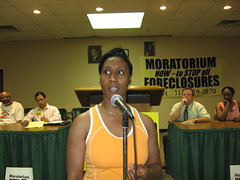
Woman speaks with Azikiwe, Cavanaugh, Scott and Clarke in background. The meeting, held on June 14, 2008, demanded a two-year moratorium on foreclosures. (Photo: Alan Pollock).
Originally uploaded by Pan-African News Wire File Photos
By Alexandra Marks
Staff writer of The Christian Science Monitor
From the July 2, 2008 edition
Reporter Alexandra Marks discusses the impact of the economy's slowdown on women
New York - This economic downturn is taking a particularly hard toll on women, according to some experts.
The reasons: Much of the downturn is focused on the real estate market, where a disproportionately large number of women work, and substantially more women than men have subprime mortgages. But experts point to another cause: Women simply earn less than men, an estimated average of 80 cents for every dollar made by a man.
"Even though women may not lose as many jobs as men, they are more vulnerable simply because their incomes are lower to start with at the beginning of the downturn," says Heidi Hartmann, president of the Institute for Women's Policy Research in Washington. "They're also more likely to be supporting children, so for them any disruption in their income is very, very serious."
Historically, men have been more sensitive to the ups and downs of economic cycles. That's in part because many work in manufacturing and construction, two areas of the economy that do well in boom times but are particularly vulnerable during recessions, according to experts. Women, on the other hand, predominantly work in more service-oriented fields like healthcare and education, which have tended to be better insulated from economic cycles. Indeed, even during most of the worst recessions during the last 40 years, job growth continued among women, just not as strongly as during the boom times. That changed during the 2001 recession, when women lost jobs for the first time in recent history.
"It looks like, this recession, women will also lose jobs ... because of the real estate crisis and the financial services crisis," Ms. Hartmann says. "Something like 142,000 women work in real estate compared to 42,000 men."
A recent Senate report found that the number of unemployed adult women increased by 20 percent from March 2007 to March 2008, compared with a 17 percent increase among adult men.
Women are also disproportionately affected by the subprime mortgage crisis, studies have shown. In 2005, 32 percent of women held subprime mortgages compared with 24 percent of men, according to a report by the Consumer Federation of America. The study cited women's lower wealth and income, historical barriers to credit for women, predatory lending, and women's lower confidence in their own financial abilities as possible reasons why women are more likely to receive subprime mortgages.
Hartmann believes the combination of these factors will have long-term consequences.
"There's no question that this recession is going to weaken the ability of women to catch up to men [in terms of their earnings]," she says.
But other experts in women's employment see a rosier picture for women. They point out that 57 percent of those graduating with college degrees are women.
"The people who are getting laid off the most are the men [in manufacturing jobs]; they're the ones who are suffering and they don't have the high graduation rates from college that women do," says Diana Furchtgott-Roth, a senior fellow at the Hudson Institute, a conservative think tank in Washington. "I would say it's the men who are doing badly."
No comments:
Post a Comment